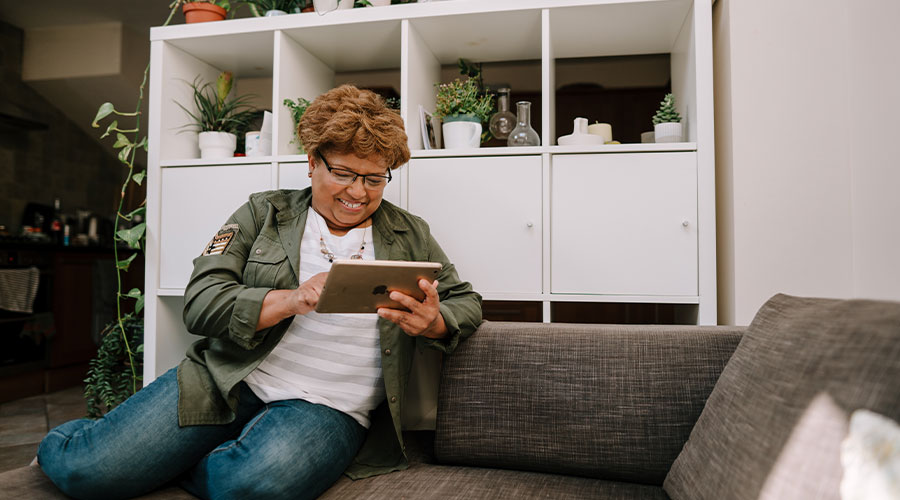- A
- A
- A
Befriending Volunteers
Help tackle loneliness in later life within your local community and beyond by applying to become a volunteer befriender
One hour. That’s all it takes to change someone’s day.
The power of conversation is something many of us take for granted, especially if we engage with people every day through work, family life and more. But, what about those in later life who live alone and rarely see family or perhaps have no family at all?
A day without conversation can have lasting consequences to someone’s mental and physical health, causing feelings of loneliness and isolation.
Volunteering opportunities available
Volunteering to support older people is a great way to make a positive impact in your community and enrich your own life. By registering to become a face-to-face or telephone/online befriender, you can help older people feel more connected, valued and happy.
Face-to-face befriending involves visiting an older person in their home or taking them out for a social activity, such as a walk or a coffee. You can provide companionship, conversation and support to someone who may be feeling lonely or isolated. You can also share your interests, hobbies and experiences with them, and learn from their wisdom and stories.
This service may be available in your area if we have a local MHA Communities scheme. You can use our service finder below to check the availability of this service near you.
Telephone/online befriending is a flexible and convenient way to reach out to an older person who may not have many opportunities to talk to someone. You can call them regularly, at a time that suits you both, and have a friendly chat about anything that interests you. You can also offer emotional support, encouragement and reassurance to someone who may be going through a difficult time.
Both face to face and telephone befriending are rewarding and fulfilling ways to volunteer your time and make a difference in the lives of older people. You can also benefit from the friendship, gratitude and satisfaction that come from helping someone else.

News and Blogs
05 March 2024
Spring Budget 2024: MHA Chief Executive Comments
There’s a gaping chasm between government funding for social care and the cost of providing care. In reality, we’re not expecting this shortfall to be addressed when the Chancellor outlines his Spring Budget this week. But what we do want is for all polit
View Article08 November 2023
Being a Befriender
You could, like Beth provide moments of joy and connection for an older person. The beauty of telephone befriending is that you can be anywhere in the country, you just need some phone signal to connect.
View Blog03 November 2023
Telephone Befriending: Carol and Jae’s Story
Hear from Carol and Jae telling us about their experience of telephone befriending at MHA and what a difference it made.
View ArticleFrequently Asked Questions (FAQs)
Befriending is a service that provides support and friendship to older people who may be feeling lonely or isolated. Befrienders can offer face-to-face, telephone, or online contact with an older person on a regular basis. Learn more about our befriending service >
Basically, face-to-face befriending means you will be visiting an older person in their home. Whereas a telephone/online befriender will make contact with an older person over the phone or online chat facility.
Both types of befriending help reduce feelings of loneliness and isolation through friendship and support.
Befriending can help reduce feelings of social isolation and loneliness, improve mental and physical health, increase confidence and self-esteem, and enhance the quality of life of older people.
- Are aged 18 and over
- Good listening skills
- Patience, empathy, and understanding of the needs of older people
- Ability to keep records of visits made
- Flexible, reliable, and punctual
- A clear sense of personal boundaries and confidentiality
- Able to provide non-judgemental support
- Engage with training and development.
You can apply online by filling out a short application form. You will also need to complete a DBS check and attend an induction training session before you start your role. Our Volunteering Team will guide you through the application prcoess and be on-hand to answer any questions you may have.
Our befrienders are matched with someone taking into account the needs and interests of the older person. Befrienders will then be introduced to the person they are going to support and the whole process is overseen by a local MHA Communities scheme or our Central Befriending team who will be there to help and support both the volunteer and the older person every step of the way.
Befriending can be flexible depending on the needs of the older person but usually, a regular time and day would be agreed on at least initially. Often but not always, visits and/or phone calls occur weekly.
The time commitment varies depending on the type of befriending you choose and the availability of the older person you are matched with. Generally, we ask for a minimum of one hour per week for at least six months.
You will receive ongoing support and guidance from a local coordinator who will match you with an older person, monitor your progress, and provide feedback. You will also have access to online resources, training opportunities, and peer support from other befrienders.

Subscribe To Our Newsletter
Keep in touch with our latest news, updates and how you can get involved to support MHA.
Sign Up